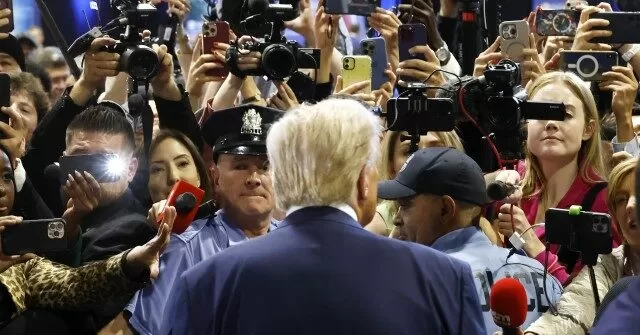The 2020 US Presidential election has been a rollercoaster ride, to say the least. From the primaries to the general election, the media has played a crucial role in shaping the narrative and influencing public opinion. However, in a surprising turn of events, even the establishment media’s hold over the election narrative seems to have been shattered. This admission comes from none other than the respected news outlet, Axios.
In a recent article, Axios’s Jim VandeHei and Mike Allen acknowledged that the establishment media’s control over the election narrative is “shattered.” This statement is a testament to the changing landscape of media and politics in the United States.
For decades, the establishment media has held a dominant position in shaping the political discourse in the country. Their influence has been so significant that they have been dubbed as the “fourth estate,” alongside the executive, legislative, and judicial branches of government. However, with the rise of social media and the increasing distrust of mainstream media, their hold over the narrative seems to be slipping.
The 2020 election has been a prime example of this shift in power. From the very beginning, the establishment media had their preferred candidate and narrative. They heavily promoted Joe Biden and portrayed him as the only viable option for defeating President Trump. However, as the election results started pouring in, it became apparent that the media’s narrative was not resonating with the American people.
Despite the media’s best efforts to portray Biden as the clear winner, the election results showed a much closer race than anticipated. This discrepancy between the media’s narrative and the ground reality has caused a significant blow to their credibility. As VandeHei and Allen put it, “the media can’t control the story anymore.”
This loss of control over the election narrative has been a wake-up call for the establishment media. They can no longer dictate the direction of the political discourse in the country. The rise of alternative media platforms, such as social media and independent news outlets, has given the American people a voice and a platform to express their opinions and challenge the mainstream narrative.
The establishment media’s influence has also been undermined by the increasing public distrust of their biased reporting. According to a recent Gallup poll, only 9% of Americans have a “great deal” or “quite a lot” of confidence in the media. This lack of trust has only been exacerbated by the media’s biased coverage of the election, further eroding their credibility.
The media’s loss of control over the election narrative also has significant implications for the future of American politics. It shows that the American people are no longer content with being force-fed a particular narrative by the media. They want to hear all sides of the story and make their own informed decisions.
This shift in power also highlights the need for the media to reevaluate and reassess their role in shaping the political discourse. They can no longer afford to be biased and one-sided in their reporting. Instead, they must strive to provide objective and unbiased coverage to regain the trust of the American people.
In conclusion, the establishment media’s control over the election narrative has been shattered. This admission by Axios is a significant milestone in the changing landscape of media and politics in the United States. It is a wake-up call for the media to reassess their role and strive for more balanced and unbiased reporting. As for the American people, it is a reminder that they hold the power to shape the political discourse in the country, and they must use it wisely.

